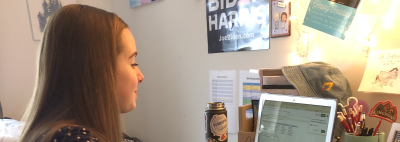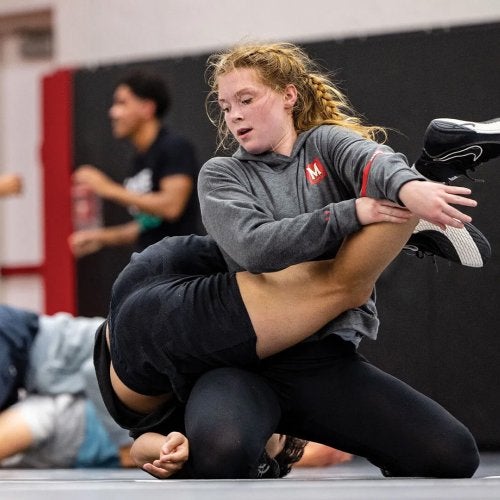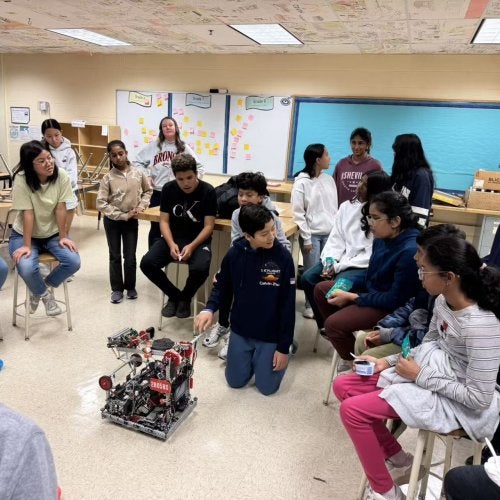

Learning How to Teach in a Pandemic
“Even though building connections with students is much harder across the screen than if you’re face-to-face, I think it really helped me to grow in confidence,” said Kieran O’Connor, B.S. ’21. “If I was able to make the genuine connection with them on screen, I’m pretty confident that I’ll able to do it in person.” O’Connor will be teaching 8th grade math and algebra I in Anne Arundel County Middle School, where she was once a student. “It’s a nice full circle moment."
While personal experiences with the pandemic were individual, living through it was not unique to anyone. The “we’re all in this together” mentality helped Lekha Tantry B.S. ’20, M.Ed. ’21 access what she called the vulnerable part of her teaching persona.
“I know a lot of teachers who think being able to teach content well is enough. It’s not enough to go into teaching because you like the subject,” she said. “If your students don’t respect you and you aren’t able to connect with the students, don’t do it. Being vulnerable is probably the most important aspect of building that rapport with students.”
Tantry took the opportunity presented by the pandemic to reexamine her teaching style. “There’s a very bare minimum for being a good teacher right now—students are not used to being told, ‘I care about you’ by their teachers. I need to explicitly state those things to my students.”
She discarded what she viewed as “outdated” advice like to not smile or be extra strict so her students don’t take advantage of her, especially as a young teacher. She asked their favorite music, their favorite restaurants, and strove for connection.
“This year was all about building relationships.”
“It made me more adaptable and flexible. We all had this plan and all that changed. Either you can be upset that your plans changed or you can learn how to roll with it and learn a new skill.”
Parker and O’Connor both taught fully virtually, while Tantry began virtually and then transferred to a hybrid setting with a handful of kids in the classroom at a time. As both students and teachers, they had to get accustomed to both learning and teaching online.
“We got to learn a lot with our professors,” said O’Connor. “They were very open knowing we were education majors. They told us their thought processes through different activities that we were doing online, and I think that that helped us … when we transitioned in [our] full time teaching positions.”
The biggest challenge of remote teaching, O’Connor joked, wasn’t hers but her roommates’. “They heard me give the same lessons four times a day from my bedroom. They are definitely up to date on middle school math curriculum.” But jokes aside, all three said remaining motivated in a time of isolation wasn’t easy.
“Zoom fatigue definitely was a thing,” said Parker, who will complete a one-year masters program in special education before pursuing a teaching position for 2022. “Between in-person classes you walk outside, you get a little mind-break.”
At times, O’Connor found the experience of all online teaching and learning emotionally and physically draining. “The motivation was definitely the most challenging for me personally,” O’Connor said.
“I wouldn’t want to do remote learning again,” said Tantry. “I sat in my bed and did all my classes and work. That’s just not balance. But I know students who benefited from virtual learning, and I also know a lot who didn’t thrive in that setting. I do wonder if some of the students I connected with in chat are people I would have connected with in person.”
Indeed, connection was key. Having already established relationships with their respective cohorts made the transition to online learning easier.
“I really love the community that College of Education brings,” said O’Connor. “It’s definitely not what any of us had in mind, but I think in some ways, it brought our cohort closer together.”
Both Parker and Tantry said they appreciated the opportunity to learn more about online teaching tools and how technology can enhance education. “I saw the things tech can do to enhance mathematical learning,” said Tantry. “I wouldn’t have branched into that aspect of the pedagogy [otherwise].”
Still, the greatest lesson of the past year was one of compassion, and it helped show each of the women what kinds of teachers they want to be.
“One that I said to my students is, ‘There are going to be days where math is not an important thing. And that’s totally okay, but I need you to tell me,’” O’Connor said. “That was a huge conversation that shifted my entire perspective on why I was really there. Because I love math, but what I care more about is my students, and their wellbeing and their learning. And if their [lack of ] wellbeing is getting in the way of their learning, I want to be a resource for them, so that we can talk through those issues, make sure that they are okay—then we can dive a little bit more into the curriculum.”


